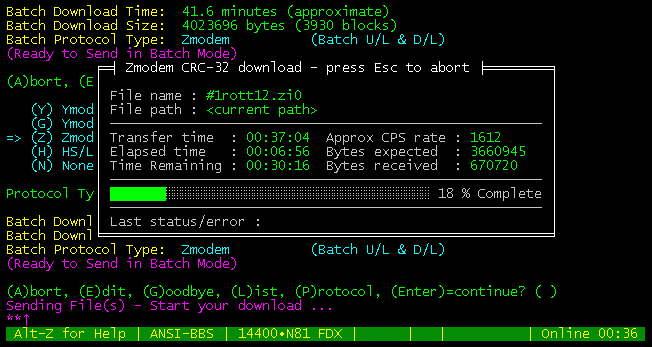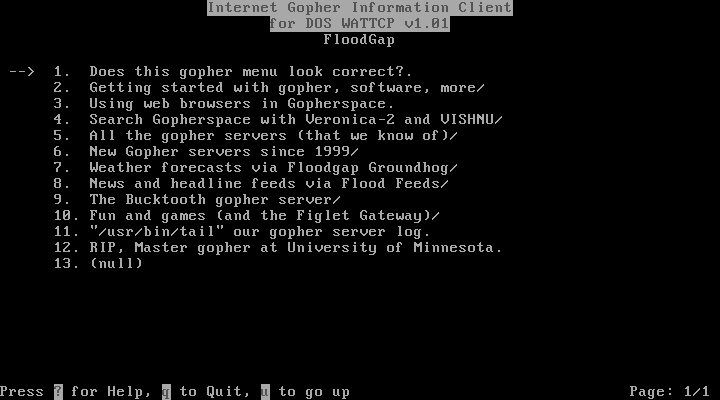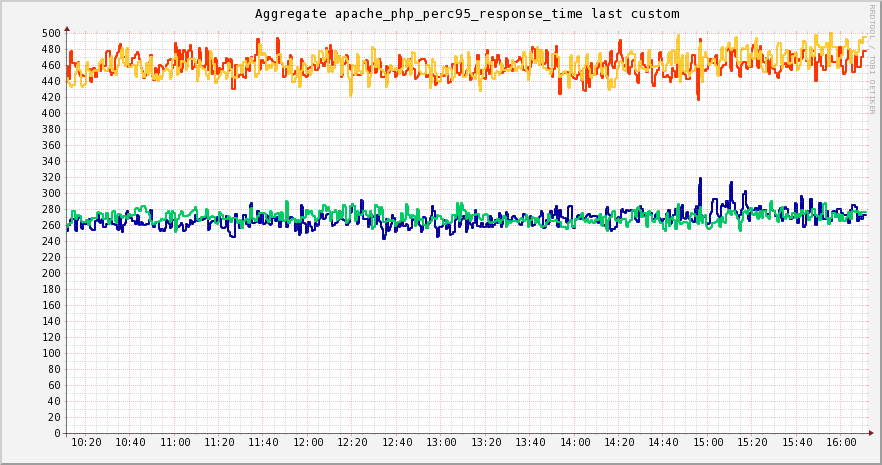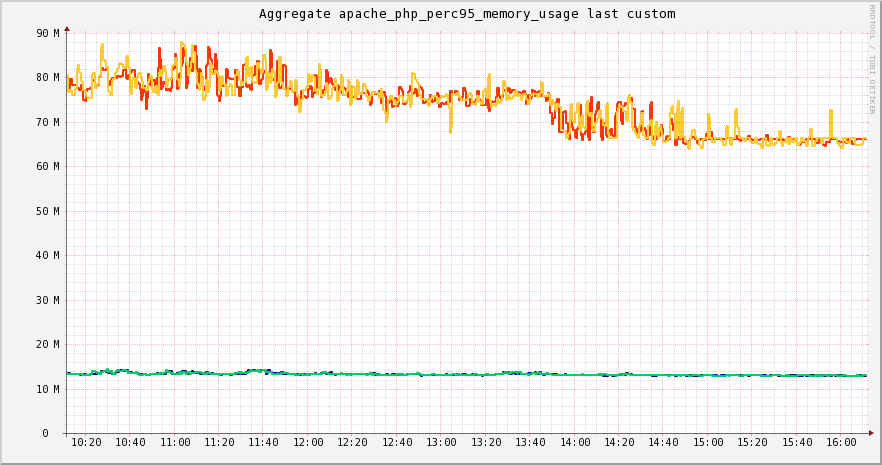PHP in 2018
Festival de Software Libre
Puerto Vallarta
Oct.28, 2017
http://talks.php.net/fsl17Rasmus Lerdorf
@rasmus
1980s




1990s


1993
#include <stdio.h>
#include <stdlib.h>
#include <ctype.h>
#include <string.h>
#define ishex(x) (((x) >= '0' && (x) <= '9') || ((x) >= 'a' && \
(x) <= 'f') || ((x) >= 'A' && (x) <= 'F'))
int htoi(char *s) {
int value;
char c;
c = s[0];
if(isupper(c)) c = tolower(c);
value=(c >= '0' && c <= '9' ? c - '0' : c - 'a' + 10) * 16;
c = s[1];
if(isupper(c)) c = tolower(c);
value += c >= '0' && c <= '9' ? c - '0' : c - 'a' + 10;
return(value);
}
void main(int argc, char *argv[]) {
char *params, *data, *dest, *s, *tmp;
char *name, *age;
puts("Content-type: text/html\r\n");
puts("<HTML><HEAD><TITLE>Form Example</TITLE></HEAD>");
puts("<BODY><H1>My Example Form</H1>");
puts("<FORM action=\"form.cgi\" method=\"GET\">");
puts("Name: <INPUT type=\"text\" name=\"name\">");
puts("Age: <INPUT type=\"text\" name=\"age\">");
puts("<BR><INPUT type=\"submit\">");
puts("</FORM>");
data = getenv("QUERY_STRING");
if(data && *data) {
params = data; dest = data;
while(*data) {
if(*data=='+') *dest=' ';
else if(*data == '%' && ishex(*(data+1))&&ishex(*(data+2))) {
*dest = (char) htoi(data + 1);
data+=2;
} else *dest = *data;
data++;
dest++;
}
*dest = '\0';
s = strtok(params,"&");
do {
tmp = strchr(s,'=');
if(tmp) {
*tmp = '\0';
if(!strcmp(s,"name")) name = tmp+1;
else if(!strcmp(s,"age")) age = tmp+1;
}
} while(s=strtok(NULL,"&"));
printf("Hi %s, you are %s years old\n",name,age);
}
puts("</BODY></HTML>");
}1993
use CGI qw(:standard);
print header;
print start_html('Form Example'),
h1('My Example Form'),
start_form,
"Name: ", textfield('name'),
p,
"Age: ", textfield('age'),
p,
submit,
end_form;
if(param()) {
print "Hi ",em(param('name')),
"You are ",em(param('age')),
" years old";
}
print end_html;1994-1995
<html><head><title>Form Example</title></head>
<body><h1>My Example Form</h1>
<form action="form.phtml" method="POST">
Name: <input type="text" name="name">
Age: <input type="text" name="age">
<br><input type="submit">
</form>
<?if($name):?>
Hi <?echo $name?>, you are <?echo $age?> years old
<?endif?>
</body></html>
✔ engine improvements
- 100%+ performance gain on most real-world applications
- Lower memory usage, sometimes drastically lower
JIT?
Improve CPU cache usage
- Step 1: Decrease overall data
- Step 2: Better data locality and less indirections
- Step 3: Save the world!
- zval size reduced from 24 to 16 bytes
- Hashtable size reduced from 72 to 56 bytes
- Hashtable bucket size reduced from 72 to 32 bytes
- Immutable array optimization
$a = [];
for($i=0; $i < 100000;$i++) {
$a[] = ['abc','def','ghi','jkl','mno','pqr'];
}
echo memory_get_usage(true);
// PHP 5.x 109M
// PHP 7.0 42M no opcache
// PHP 7.0 6M with opcache enabled- New memory allocator similar to jemalloc
- Faster hashtable iteration API
- Array duplication optimization
- PCRE JIT enabled by default
- Precomputed string hashes
- Fast ZPP (ZendParseParameters) implementation
- Faster stack-allocated zvals (instead of heap)
- Optimized VM calling
- Global register variables with gcc 4.8+
- plus hundreds of micro-optimizations
JIT?
GCC Feedback-Directed Optimization (FDO)
$ gcc --version
gcc (Debian 6.3.0-14) 6.3.0 20170415
$ make clean
$ make -j8 prof-gen
...
$ sapi/cgi/php-cgi -T 1000 /var/www/wordpress/index.php > /dev/null
$ make prof-clean
$ make -j8 prof-usePHP 7 in production



Saving the Planet?
- Around 2 billion sites on the web
- On 10 million physical machines
- PHP drives at least 50%
- Currently ~5% PHP 7 Adoption
- which is about 250k physical servers
- 3000 KWH/year per server costs approx. US$400
- Data center cooling doubles that
- 0.5kg CO2 per KWH
At 5% Adoption
- US $200M savings
- 750M KWH Savings
- 375M kg less CO2
At 100% Adoption
- $4B savings
- 15B KWH Savings
- 7.5B kg less CO2
Do your part
Upgrade to PHP 7!
PHP 7.2
Initial DCE and SCCP optimizations
Parameter Type Widening
class Orig {
public function fn(array $arg) { }
}
class Wider extends Orig {
public function fn($arg) { }
}In PHP 7.1 you would get:
Warning: Declaration of Wider::fn($arg) should be
compatible with Orig::fn(array $arg)Allow trailing commas everywhere
// Arrays (already possible)
$array = [1, 2, 3,];
// Grouped namepaces
use Foo\Bar\{ Foo, Bar, Baz, };
// Function/method arguments (call)
fooCall($arg1, $arg2, $arg3,);
use Foo\Bar\{ Foo, Bar, Baz, };
class Foo implements
// Interface implementations on a class
FooInterface,
BarInterface,
BazInterface,
{
// Trait implementations on a class
use
FooTrait,
BarTrait,
BazTrait,
;
// Class member lists
const
A = 1010,
B = 1021,
C = 1032,
D = 1043,
;Object typehint
function fn(object $obj): object {
return json_decode('{}');
}
fn("not an object");Warning: Uncaught TypeError: Argument 1 passed to fn() must be an object,
string given, called in php shell code on line 1 and defined in ...Deprecate unquoted strings
echo HELLO;Warning: Use of undefined constant HELLO - assumed 'HELLO' (this will throw
an Error in a future version of PHP) in php shell code on line 1extra headers array arg for mail() and mb_send_mail()
$to = 'nobody@example.com';
$subject = 'the subject';
$message = 'hello';
$headers = ['From' => 'webmaster@example.com',
'Reply-To' => 'webmaster@example.com',
'X-Mailer' => 'PHP/' . phpversion() ];
mail($to, $subject, $message, $headers);Argon2i added to password_hash()
$options = [
'memory_cost' => 2048,
'time_cost' => 10,
'threads' => 2
];
echo password_hash("rasmuslerdorf", PASSWORD_ARGON2I, $options);$argon2i$v=19$m=2048,t=10,p=2$akUuWkoxRDlMSi5TVGhYLg$j0D1Cl4aR8UMHOGGx5JtZ1BmCApr8RmOJA9qFWm5mz8Add Sodium Crypto Library
// On Alice's computer:
$msg = 'This comes from Alice.';
$signed_msg = sodium_crypto_sign($msg, $secret_sign_key);// On Bob's computer:
$original_msg = sodium_crypto_sign_open($signed_msg, $alice_sign_publickey);
if ($original_msg === false) {
throw new Exception("Invalid signature");
} else {
echo $original_msg; // Displays "This comes from Alice."
}Things that may break your code
- mcrypt extension has been removed
- __autoload() deprecated, use spl_autoload_register()
- create_function() deprecated, use anonymous functions
- each() deprecated, use foreach()
- read_exif_data() deprecated, use exif_read_data()
Full details are at:
And for extension authors:
Dead Code Elimination (DCE)
Escape Analysis
Sparse Conditional Constant Propagation
php -d opcache.optimization_level=-1 -d opcache.opt_debug_level=0x20000 scriptfunction fn() {
$a = 1;
return 0;
}PHP 7.1
fn: (lines=2, args=0, vars=1, tmps=0)
L0: ASSIGN CV0($a) int(1)
L1: RETURN int(0)PHP 7.2
fn: (lines=1, args=0, vars=0, tmps=0)
L0: RETURN int(0)function foo(string $s1, string $s2, string $s3, string $s4) {
$x = ($s1 . $s2) . ($s3 . $s4);
$x = 0;
return $x;
}PHP 7.1 PHP 7.2
foo: (lines=10, args=4, vars=5, tmps=3) foo: (lines=5, args=4, vars=4, tmps=3)
L0: CV0($s1) = RECV 1 L0: CV0($s1) = RECV 1
L1: CV1($s2) = RECV 2 L1: CV1($s2) = RECV 2
L2: CV2($s3) = RECV 3 L2: CV2($s3) = RECV 3
L3: CV3($s4) = RECV 4 L3: CV3($s4) = RECV 4
L4: T6 = CONCAT CV0($s1) CV1($s2) L4: RETURN int(0)
L5: T7 = CONCAT CV2($s3) CV3($s4)
L6: T5 = CONCAT T6 T7
L7: ASSIGN CV4($x) T5
L8: ASSIGN CV4($x) int(0)
L9: RETURN CV4($x)Try to trick it
function foo($a) {
$b = $a += 3;
return $a;
}PHP 7.2
foo: (lines=3, args=1, vars=1, tmps=1)
L0: CV0($a) = RECV 1
L1: ASSIGN_ADD CV0($a) int(3)
L2: RETURN CV0($a)But...
function foo(int $x, int $y) {
$a = [$x];
$a[1] = $y;
$a = $y;
return $a;
}PHP 7.2 PHP 7.3
foo: (lines=7, args=2, vars=3, tmps=1) foo: (lines=4, args=2, vars=3, tmps=0)
L0: CV0($x) = RECV 1 L0: CV0($x) = RECV 1
L1: CV1($y) = RECV 2 L1: CV1($y) = RECV 2
L2: CV2($a) = INIT_ARRAY 1 CV0($x) NEXT L2: CV2($a) = QM_ASSIGN CV1($y)
L3: ASSIGN_DIM CV2($a) int(1) L3: RETURN CV2($a)
L4: OP_DATA CV1($y)
L5: ASSIGN CV2($a) CV1($y)
L6: RETURN CV2($a)class A { }
function foo(int $x) {
$a = new A;
$a->foo = $x;
return $x;
}PHP 7.3
foo: (lines=2, args=1, vars=1, tmps=0)
L0: CV0($x) = RECV 1
L1: RETURN CV0($x)class A {
function __destruct() {}
}
function foo(int $x) {
$a = new A;
$a->foo = $x;
return $x;
}PHP 7.3
foo: (lines=7, args=1, vars=2, tmps=1)
L0: CV0($x) = RECV 1
L1: V2 = NEW 0 string("A")
L2: DO_FCALL
L3: CV1($a) = QM_ASSIGN V2
L4: ASSIGN_OBJ CV1($a) string("foo")
L5: OP_DATA CV0($x)
L6: RETURN CV0($x)function foo() {
$a = 1;
$b = $a + 2;
$a += $b;
return $a;
}PHP 7.2
foo: (lines=1, args=0, vars=0, tmps=1)
L0: RETURN int(4)PHP 7.3
foo: (lines=1, args=0, vars=0, tmps=0)
L0: RETURN int(4)function foo(int $x) {
if ($x) {
$a = [0,1];
} else {
$a = [0,2];
}
return $a[0];
}PHP 7.3
foo: (lines=2, args=1, vars=1, tmps=0)
L0: CV0($x) = RECV 1
L1: RETURN int(0)function foo() {
$o = new stdClass();
$o->foo = 0;
$i = 1;
$c = $i < 2;
if ($c) {
$k = 2 * $i;
$o->foo = $i;
echo $o->foo;
}
$o->foo += 2;
$o->foo++;
return $o->foo;
}PHP 7.3
foo: (lines=2, args=0, vars=0, tmps=0)
L0: ECHO int(1)
L1: RETURN int(4)Static Analysis
It can catch dumb mistakes
$a = [1,2,3];
if(count($a > 1)) {
echo "Test";
}% phan test.php
test.php:2 PhanTypeComparisonFromArray array to int comparisonCheck phpdoc comments
class C {
/** @var int $prop */
public $prop;
/**
* @param string $arg
* @return int
*/
function test(?$arg) {
$this->prop = $arg;
return $arg;
}
}% phan test.php
test.php:9 PhanTypeMismatchDeclaredParamNullable Doc-block of $arg in test
is phpdoc param type string which is not a permitted replacement
of the nullable param type ?string declared in the signature
('?T' should be documented as 'T|null' or '?T')
test.php:10 PhanTypeMismatchProperty Assigning string to property
but \C::prop is int
test.php:11 PhanTypeMismatchReturn Returning type string
but test() is declared to return intHelp with refactoring
class C {
/**
* @deprecated
*/
static function legacy_function() { }
}
C::legacy_function();% phan test.php
test.php:8 PhanDeprecatedFunction Call to deprecated function
\C::legacy_function() defined at test.php:5Install with composer
$ composer require --dev phan/phanCreate .phan/config.php
<?php
use \Phan\Issue;
return [
'should_visit_all_nodes' => true,
'minimum_severity' => Issue::SEVERITY_LOW,
'directory_list' => [ 'src', 'vendor' ],
'exclude_analysis_directory_list' => [ 'vendor' ]
];$ ./vendor/bin/phanType Safety
Legacy code
class Data {
function __construct($data) {
$this->haystack = $data;
}
function find($needle) {
return in_array($needle, $this->haystack, true);
}
}
$storage = new Data(['apple','orange','banana']);
$fruit = false;
$storage->find($fruit);Going straight to strict types risks runtime fatals
<?php declare(strict_types=1);
class Data {
function __construct(array $data) {
$this->haystack = $data;
}
function find(string $needle):bool {
return in_array($needle, $this->haystack, true);
}
}
$storage = new Data(['apple','orange','banana']);
$fruit = false;
$storage->find($fruit);Fatal error: Uncaught TypeError: Argument 1 passed to Data::find() must be of the type string, boolean given,
called in test.php on line 13 and defined in test.php:6
Stack trace:
#0 test.php(13): Data->find(false)
#1 {main}
thrown in test.php on line 6Intermediate step
class Data {
/** @var array $haystack */
public $haystack;
/**
* @param array $data
*/
function __construct($data) {
$this->haystack = $data;
}
/**
* @param string $needle
* @return bool
*/
function find($needle) {
return in_array($needle, $this->haystack, true);
}
}
$storage = new Data(['apple','orange','banana']);
$fruit = false;
$storage->find($fruit);$ phan test.php
test.php:22 PhanTypeMismatchArgument Argument 1 (needle) is bool
but \Data::find() takes string defined at test.php:15Thank You
Report Bugs
Useful bug reports, please!